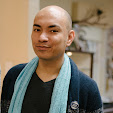It's another late night and still rest does not find me easily. I've been smoothing my mind over ideas of abstraction and figurative painting. Of what these terms have become and how they've changed and are constantly supplanting one another in popularity and debate. I imagine that I do this to attempt to navigate my own work and rediscover what is important for me as an artist.
This brought me to think of two artists, which are in theory dramatically posed against one another and yet are very much on the same page - Odd Nerdrum and Mark Rothko.
Above: (Left) Oil painting by Odd Nerdrum titled, "Flock". (Right) "No. 14" by Mark Rothko.
Mark Rothko once said, "It was with the utmost reluctance that I found the figure could not serve my purposes. But a time came when none of us could use the figure without mutilating it." Instead of the figure, Rothko evoked the power of color, texture, and the sensibilities of light to capture pure emotion. Even though his work appears during the dominance of the non-objective and abstract art, he didn't consider himself an abstractionist. He denounced the idea constantly, saying, "I’m not an abstractionist. I’m not interested in the relationship of color or form or anything else. I’m interested only in expressing basic human emotions: tragedy, ecstasy, doom, and so on."
Odd Nerdrum is primarily a figurative painter. He is often referred to as, "the new Old Master" and his work is constantly compared to that of Caravaggio and Rembrandt. He writes extensively on his ideas of Kitsch and on the movement of the figure in the contemporary art world. In fact he openly accepts the mantle of a "kitsch painter". Nerdrum's works attempt to engage the sensuality of the experience of viewing art, appealing to the viewer and their humanity and how they perceive it. He uses his skill and craftsmanship as a tool to become a "better" artist. His ideas are often in conflict with that of abstractionists, saying that "it makes for pretty wall-paper."
It's funny how drastically opposed to one another they are set. Rothko thinks that craftsmanship is over-rated if done in lieu of idea and emotion. Nerdrum believes that "craftsmanship is what develops our thoughts... as a kind of miracle cure." He goes on to say that the mastery of a material ends in a "catharsis" which makes good work. Rothko refuses to use the figure and Nerdrum uses it as his primary vehicle. Both are seemingly at opposite ends.


Above: (Left) "1957, No. 20" by Mark Rothko. (Right) Another painting titled, "Flock" by Odd Nerdrum.
Even though they seemed utterly at odds with one another as far as their work is concerned, they are not so different. Each artist attempts to express emotion, whether as a manifestation of the spiritual or as a depiction of the human condition. Each tries to engage the viewer in feeling something more palatable than a passing consideration of color theory or art historical relevance.
Although I know it is never a good idea to compare work on just how it looks (as it will often times leads to false assumptions and misnomers), I will (in this case) be quiet and let the work speak for itself. And leave off with another Rothko quote:
"Silence is so accurate."



















3 comments:
I know Rothko is considered" a great painter". What is Odd Nerdrum considered? what do you think will be the concensus (SP?) in 100 years?
jean. curious
Who knows how this will all play out? I think it's easy to quantify Rothko as a great painter because he's dead and can't make anymore work. With Nerdrum, he definitely has mastery over Old Master techniques, is successful and really hot right now, and his work can be attributed to helping revamp interest in the figure in art. HOWEVER, he's receiving a lot of criticism for his writings on kitsch. Perhaps because the way the art world is set up a great deal of power rests in the hands of the critics and Nerdrum basically says to cut the middle man out and experience it for yourself - that you don't need someone to tell you it's good to know that it's good. I think they might feel threatened. At least a tiny bit uneasy... and you know what they say, "Be careful of who you have write your eulogy."
cool and cogent response! cutting out the middlemen, eh? hah!
and never heard the eulogy saying before. very interesting.
Post a Comment